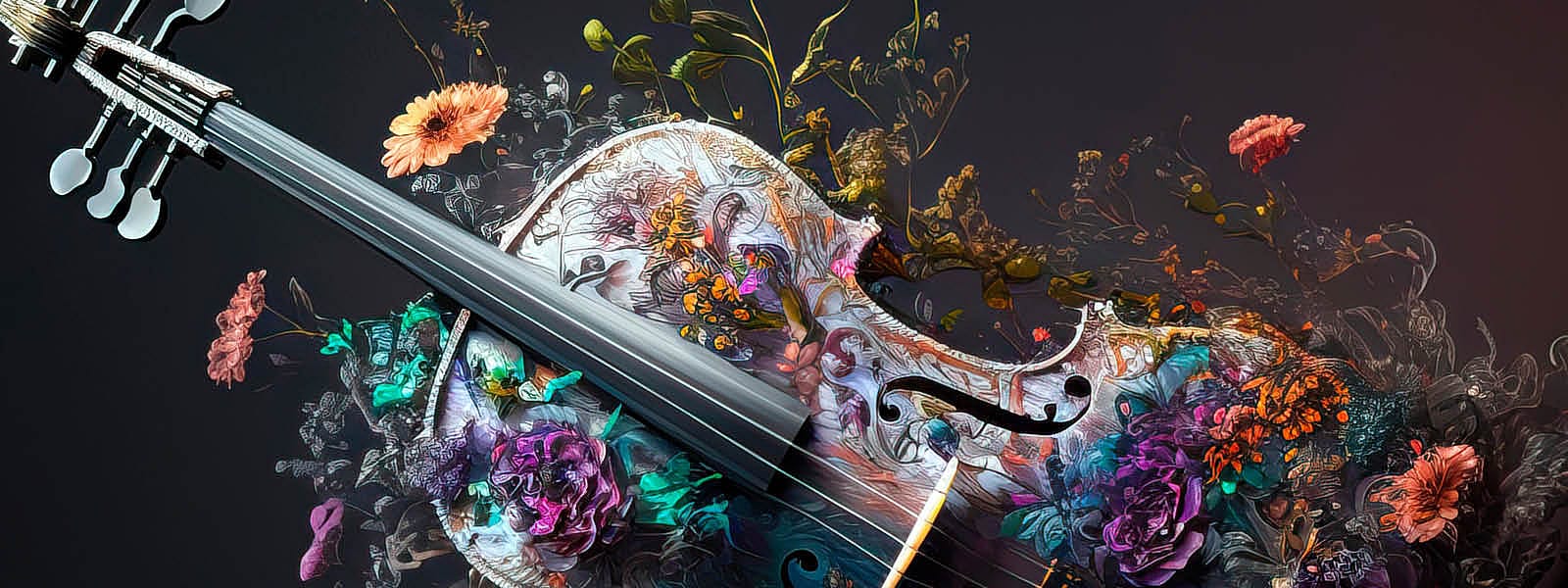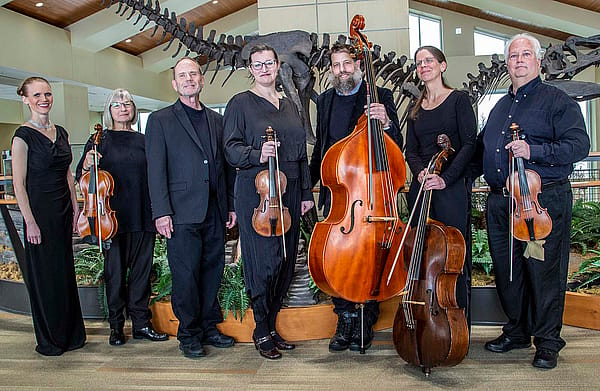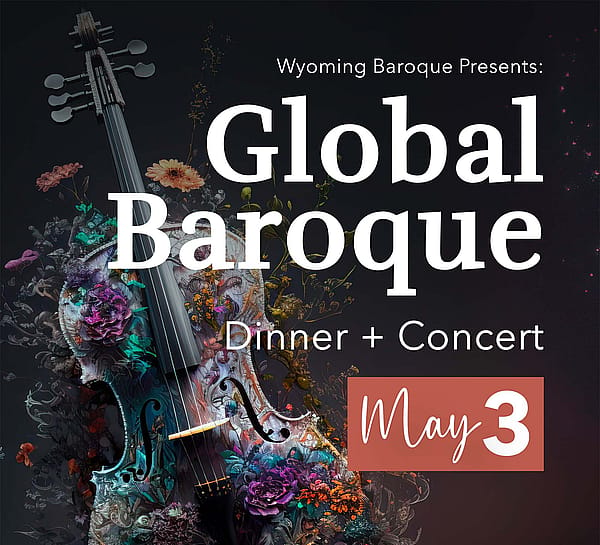
- This event has passed.
Classical Concert & Italian Dinner
May 3, 2024 @ 6:00 pm - 8:00 pm MDT

Wyoming Baroque Presents Global Baroque
A Classical Concert & Italian Dinner
May 3, 2024
Dinner at 6 p.m.
Concert at 7 p.m.

Join us for an amazing evening with appetizers, a delicious Chef’s Italian dinner, dessert, and cash bar, followed by a moving classical music concert by the Wyoming Baroque ensemble on Friday, May 3. Doors open at 5:30 p.m., dinner is served at 6 p.m., and concert begins at 7 p.m.
Italian Dinner Menu
• Mediterranean chicken
• Pasta primavera
• Roasted broccolini
• Caesar salad
• Tuscan bacci rolls
• Tiramisu cake or limon cake for dessert
• Freshly brewed coffee.
In the 17th and early 18th centuries, composers invented a new, expressive musical style designed to stir the listener’s emotions. Later called “Baroque,” this musical language spread internationally and is sometimes referred to as the first global genre of music. Wyoming Baroque’s “Consort of Nations” showcases 18th-century composers from Europe, Africa, North America, and South America and their unique musical language.
The concert is under the direction of Wyoming Baroque Music director Dr. Mark Elliot Bergman. Instruments featured include two baroque violins, a baroque viola, baroque cello, baroque double bass, harpsichord, and baroque soprano. This is a unique opportunity to hear Baroque music performed in keeping with how it was originally composed.
Tickets for Wyoming Baroque Presents Global Baroque are $75 per person general admission, and $65 per person for Buffalo Bill Center of the West members.
The Music
Abdelazer Suite, H. Purcell (1655–1695): English composer Henry Purcell composed these courtly dances as incidental music to Aphra Behn’s Restoration-era drama “Abdelazer, or The Moor’s Revenge.” Behn, one of the first English women to earn her living as a writer, describes Abdelazer’s plot to exact vengeance from the King of Granada for wrongs committed against his family. Purcell’s music is equally dramatic.
 Barukh Habba (Psalm 118: 26–29), Anonymous: Sephardi fleeing the Inquisition on the Iberian peninsula, established the first Jewish community in New Amsterdam in 1684. Their distinctive liturgical music tradition became a primary vehicle for defining Jewish identity. The melody for Barukh Habba is ubiquitous in Western and Moroccan Sephardic traditions. It dates back to at least the 18th century and was performed during the American Revolutionary War on the occasion of the consecration of the new synagogue in Philadelphia, Mikve Israel, in 1782. The text, from Psalms 118:26–29, is often employed at weddings and consecrations.
Barukh Habba (Psalm 118: 26–29), Anonymous: Sephardi fleeing the Inquisition on the Iberian peninsula, established the first Jewish community in New Amsterdam in 1684. Their distinctive liturgical music tradition became a primary vehicle for defining Jewish identity. The melody for Barukh Habba is ubiquitous in Western and Moroccan Sephardic traditions. It dates back to at least the 18th century and was performed during the American Revolutionary War on the occasion of the consecration of the new synagogue in Philadelphia, Mikve Israel, in 1782. The text, from Psalms 118:26–29, is often employed at weddings and consecrations.
Crooked Shanks, Accramar Mareycoo (1746–1826): Mareycoo, also known as Newport Gardner, was an enslaved African (probably from Ghana) who lived in Newport, Rhode Island. He would later earn his freedom and move to Liberia. Published in 1803, Crooked Shanks is a charming gig and Mareycoo’s only surviving composition. It is also the first known work published by a Black composer in the United States.
Ya La Gloria, Manuel de Zumaya (1678–1755): Arguably the best-known composer from 18th-century “New Spain” (Mexico), Manuel de Zumaya, was born in Mexico and had Native American and European ancestry. He was appointed chapelmaster of Mexico City’s cathedral in 1715, and his music reflected the “modern” sound of the era.
Excerpts from the Ephrata Cloister, Ephrata Community: The Ephrata Cloister, founded in 1732, was a celibate, ascetic, German-speaking, Sabbatarian commune in rural Pennsylvania. Its residents created hymns and motets employing an original system of musical composition. Because Ephrata produced no heirs, documentation was scattered and mostly forgotten. Ephrata composers, often women, rejected metrical consistency and employed unorthodox meters and rhythm. Because of this, their music has a distinctive character, unlike their contemporaries.
Excerpts from The Codex Martinez Compañón, Anonymous: The Codex Martínez Compañón is a late 18th-century manuscript edited in nine volumes by the bishop of Trujillo, Peru. The codex includes almost 1,500 watercolor images depicting the plants and animals of the region, as well as Indian life, clothing, and customs. It also includes 20 musical scores by anonymous indigenous composers reflecting dances and customs of the region and era.
Wyoming Baroque performing Pergolesi’s Stabat Mater
About Wyoming Baroque
Wyoming Baroque promotes, performs, and advocates for music and music education in Wyoming and beyond, with particular attention to historically informed performance practice. The ensemble features artists specializing in performances of 17th and 18th Century repertoire and contemporary compositions.
Wyoming Baroque is in residence at Sheridan College in Sheridan, Wyoming. Committed to education and arts advocacy, Wyoming Baroque also presents masterclasses at schools and community centers throughout the region. The musicians play reproductions of 17th and 18th century instruments and use baroque tuning. Learn more at www.wyomingbaroque.org.
Details
- Date:
- May 3, 2024
- Time:
-
6:00 pm - 8:00 pm MDT
- Event Tags:
- classical concert, classical music, Italian dinner, Wyoming Baroque
Venue
Organizer
- Events
- Phone
- 307-578-4000
- events@centerofthewest.org
